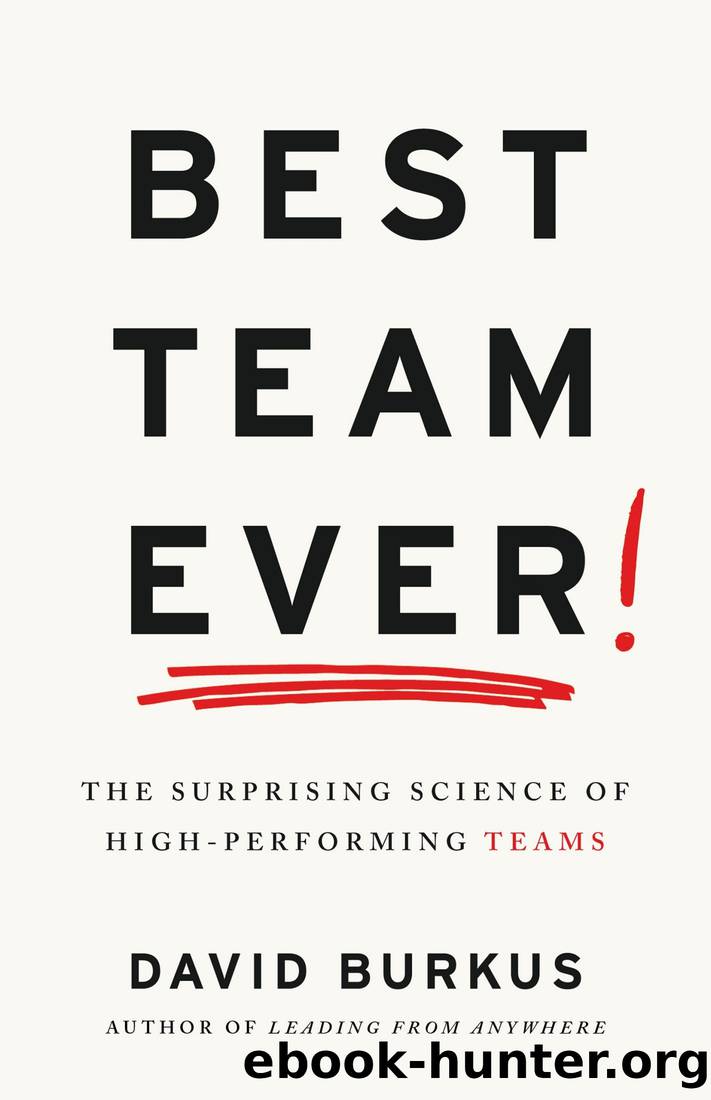Best Team Ever: The Surprising Science of High-Performing Teams by David Burkus

Author:David Burkus [Burkus, David]
Language: eng
Format: epub
ISBN: 9781544541754
Google: jZ7wzwEACAAJ
Amazon: B0C4R2YLNF
Publisher: Twinbolt
Published: 2023-05-29T18:30:00+00:00
Respect Starts at the Top
Wilderotterâs turnaround at Frontier serves as a compelling example of why psychological safety is more than just trust. Unless leaders and team members demonstrate they respect the differing opinions of others, whatever trust is built quickly dissipates. Without respect, the virtuous cycle of trust weâre seeking to build can quickly reverse course to become a vicious cycle of distrust.
And, sadly, respect in most workplaces is as absent as it was at Frontier when Maggie Wilderotter took over leadership. At a minimum, feeling respected is a rare occurrence for most workers. In 2014, researchers Christine Porath and Tony Schwartz surveyed more than twenty thousand employees around the world and found that 54 percent said that they didnât get regular respect from their leader.âµÂ¹ And getting respect, or not getting it, made a huge difference in their engagement and performance.
Employees who got respect from their leaders reported 89 percent higher satisfaction with work and 56 percent better well-being and overall health. They also reported 92 percent greater focus. Overall, they were 55 percent more engaged.âµÂ² In fact, in their survey, Porath and Schwartz found that no other leadership behavior had a bigger effect on employee outcomes than respect toward subordinates.âµÂ³
In a different study, Porath focused on those who had experienced incivility or disrespect at work. Among people whoâd been disrespected at work, 48 percent said they intentionally decreased their effort, and 38 percent said they intentionally decreased the quality of their work. A full 66 percent said their performance declined, and 78 percent said their commitment to their employer declined.âµâ´
Itâs no wonder, then, that showing respect often affects long-term career performance, as well. Porathâs research has shown that people who model respect tend to move toward central positions in the informal network of an organization. They become the connectors of ideas and people. They go out of their way to share information and provide help to others. As a result, theyâre more likely to be seen as leaders. By contrast, disrespectful behavior can limit career growth in organizations. High performers who receive too much disrespect from too many people in an organization become thirteen times more likely to quit than low or average performers in the same disrespectful cultureâwhich has a massively negative effect on organizational performance.
And the same positive benefits of respect are found in the way teammates treat each other. In a study of incivility and respect in medical settings, twenty-four Israeli medical teams from four neonatal intensive care units participated in training to improve the quality of care for premature infants. As part of the training, teams simulated how theyâd respond to an infant whose health was crashing due to an intestinal illness. The teams not only had to discover the intestinal cause, but they also had to treat it quickly. To compare the teams, all teams were told theyâd be observed by an expert from the United Statesâbut some teams were given a neutral greeting from the âexpert,â and others received an insulting message about the poor quality of Israeli medical care.
Download
This site does not store any files on its server. We only index and link to content provided by other sites. Please contact the content providers to delete copyright contents if any and email us, we'll remove relevant links or contents immediately.
Hit Refresh by Satya Nadella(8347)
The Compound Effect by Darren Hardy(7586)
Change Your Questions, Change Your Life by Marilee Adams(6668)
Nudge - Improving Decisions about Health, Wealth, and Happiness by Thaler Sunstein(6648)
The Black Swan by Nassim Nicholas Taleb(6213)
Daring Greatly by Brene Brown(5666)
Deep Work by Cal Newport(5514)
Principles: Life and Work by Ray Dalio(5342)
Rich Dad Poor Dad by Robert T. Kiyosaki(5174)
The Myth of the Strong Leader by Archie Brown(4797)
Man-made Catastrophes and Risk Information Concealment by Dmitry Chernov & Didier Sornette(4756)
Big Magic: Creative Living Beyond Fear by Elizabeth Gilbert(4741)
The Slight Edge by Jeff Olson(4732)
Discipline Equals Freedom by Jocko Willink(4649)
Digital Minimalism by Cal Newport;(4587)
The Motivation Myth by Jeff Haden(4542)
Stone's Rules by Roger Stone(4427)
Management Strategies for the Cloud Revolution: How Cloud Computing Is Transforming Business and Why You Can't Afford to Be Left Behind by Charles Babcock(4141)
The Doodle Revolution by Sunni Brown(4056)
